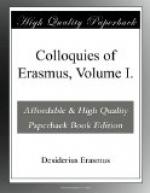As to his Familiarity with Sir Thomas More, there are several Stories related, and especially one concerning the Disputes that had been between them about Transubstantiation, or the real Presence of Christ in the consecrated Wafer, of which Sir Thomas was a strenuous Maintainer, and Erasmus an Opponent; of which, when Erasmus saw he was too strongly byassed to be convinced by Arguments, he at last made use of the following facetious Retortion on him. It seems in their Disputes concerning the real Presence of Christ in the Sacrament, which were in Latin, Sir Thomas had frequently used this Expression, and laid the Stress of his Proof upon the Force of Believing, Crede quod edis et edis, i.e. Believe you eat [Christ] and you do eat him; therefore Erasmus answers him, Crede quod habes et habes, Believe that you have [your Horse] and you have him. It seems, at Erasmus’s going away, Sir Thomas had lent him his Horse to carry him to the Sea-side or Dover; but he either carried him with him over Sea to Holland, or sent him not back to Sir Thomas, at least for some Time; upon which Sir Thomas writing to Erasmus about his Horse, Erasmus is said to have written back to him as follows.
Ut mihi scripsisti
de corpore Christi,
Crede
quod edis et edis.
Sic tibi rescribo
de tuo Palfrido;
Crede
quod habes et habes.
Being arriv’d at Flanders by the Interest of Sylvagius Chancellor to Charles of Austria, afterwards Emperor of Germany, known by the name of Charles V: he was made one of his Counsellors.
In the mean Time Johannes Frobenius, a famous Printer, having printed many of his Works at Basil in Switzerland, and being much taken with the Elegancy of his Printing, and the Neatness of his Edition, he went thither, pretending that he undertook that Journey for the Performance of some Vow he had made; he was kindly entertain’d by him, and publish’d several Books there, and dedicated this his Book of Colloquies to Frobenius’s Son, and resided till the Mass had been put down there by the Reformers. When he left that Place, he retir’d to Friburg in Alsace. Before his going to Friburg, he visited the low Countries to settle certain Affairs there. And was at Cologn at the Time that the Assembly was at Worms, which being dissolv’d, he went again to Basil, either, as some say, for the Recovery of his Health, or, as others, for the publishing of several Books. He receiv’d the Bounty and Munificence of several Kings, Princes, and Popes, and was honourably entertain’d by many of the chief Cities which he pass’d through. And by his Procurement, a College of three Languages was instituted at Louvain, at the Charge of Hieronimus Buslidius, Governour of Aria,




